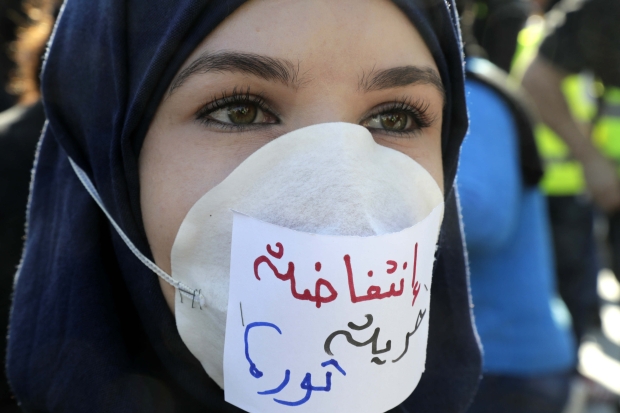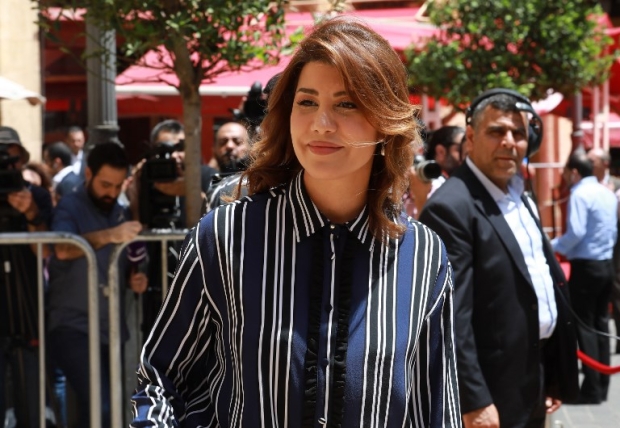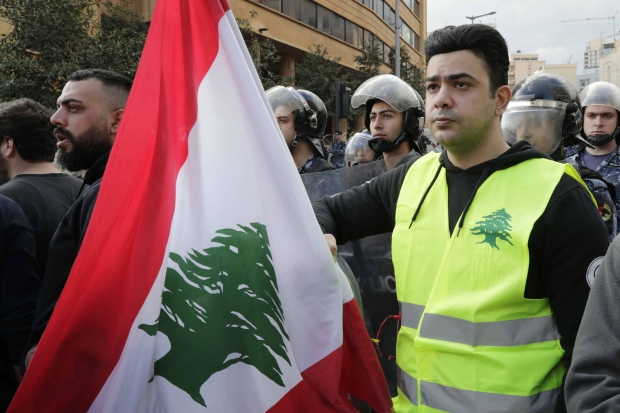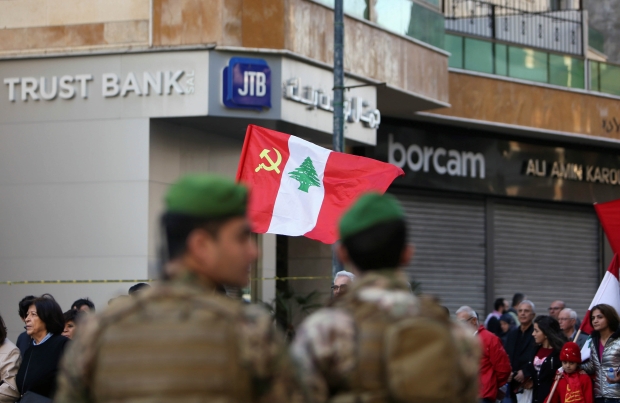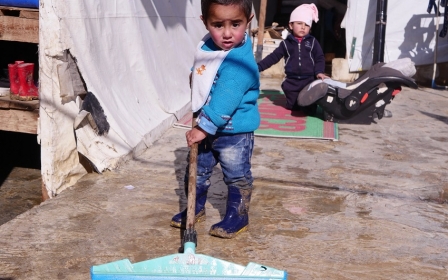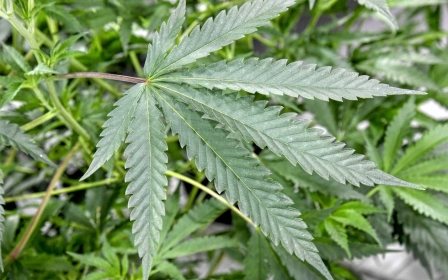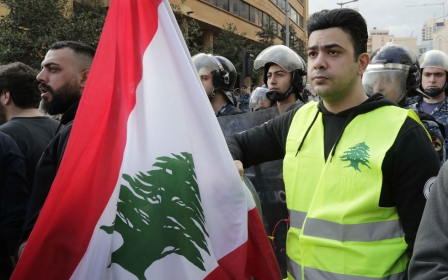As Lebanon’s political class fails, Beirut’s streets are stirring once again
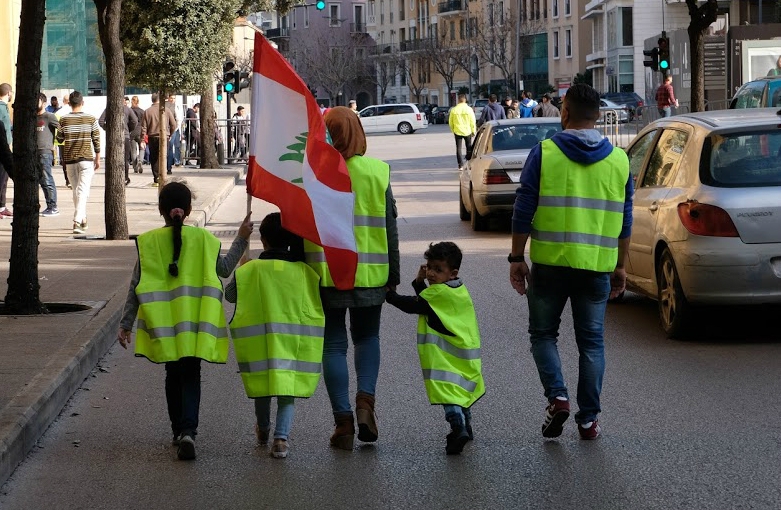
BEIRUT – Lebanese are taking to the streets once again, as the nagging sense of frustration at the political class’s failings draws a new spate of protest movements.
But while demonstrators have historically found protesting one of the only ways to voice their wide-ranging concerns, disaffected Lebanese are now seeking to unite around a clearer vision they can take from the streets to the halls of power.
The question is, can the disparate civil society groups and outsider politicians find a way to unite and enact real change in Lebanon’s stagnant political system?
It has been eight months since parliamentary elections were held for the first time in nine years. But rather than breathing new life into the system, they have cast Lebanon into a political purgatory, as politicians fail to form a government.
It’s a familiar situation in a country where sectarianism and clientelism often brings the cogs of governance to a standstill.
“We need to attract Lebanese to step away from the clientelistic politicians towards a new structure based firmly in the grassroots,” Paula Yacoubian, the only MP elected in May from a list of independents, told Middle East Eye.
On Sunday, several thousand marched to the finance ministry in Beirut to protest rumoured plans to hike the value-added tax and reduce fuel subsidies. Called by the Lebanese Communist Party, workers unions and a host of independent groups, it was the biggest protest in a series that began more than two months ago.
Last week, scores of students protested the economic situation and rising university tuition fees.
Hundreds demanded economic and social justice at a protest ranging from Beirut’s labour ministry to the health ministry days before that, and thousands took part in two separate demonstrations last month – including one where many wore yellow vests, in a nod to French protestors who popularized the "gilets jaunes" during protests in Paris.
We need to attract Lebanese to step away from the clientelistic politicians towards a new structure based firmly in the grassroots
- Paula Yacoubian, independent MP
The demonstrations also show no sign of abating: activists have announced a rally on 2 February.
These protests are the largest series of mobilizations in Beirut since the capital was rocked by demonstrations in 2015, sparked then by mismanagement of the solid waste sector that caused garbage to pile up on the capital’s streets.
Tens of thousands voiced wide-ranging demands for an end to corruption and the downfall of the sectarian political system Lebanon has used since independence.
That said, the events of 2015 gave birth to a vibrant set of independent groups that have since participated in both municipal and national elections.
It's about the economy and much, much more
The new wave of protests are linked by the perception that time is running out to reverse Lebanon’s economic nosedive, which demonstrators believe they will feel the consequences of.
People are mobilizing “based on immediate, joint interests, rather than just on ideals,” according to Nizar Hassan, a member of independent group Lihaqqi, which ran candidates in May's elections.
Officials, including the economy and finance ministers, have warned the country needs to implement serious reform to prevent a collapse. Conditions have gotten worse despite the international community pledging more than $11 billion in soft loans to Lebanon for infrastructural projects at an April conference. But for those loans to be unlocked, a cabinet must be formed.
Hassan said Lebanon was now at a “historic moment of transition, where the ruling class has to either redistribute the failures of their policies in an unjust way, or take responsibility for their actions.”
“The crisis should be paid for by those who have benefited from this economic model for decades: the big real estate businesses, banks, and large companies that have paid little taxes,” Hassan said.
While concern on the economy is warranted, Claude Jabre, a member of the You Stink movement that led the 2015 protests, cautioned that a focus on economic collapse could end up serving the interest of politicians. “They always use the tactics of fear: it’s the shock doctrine; they destabilize you and then pass whatever they want.”
He told MEE that officials are likely eying privatisation of Lebanon’s public-sector bodies, including the water and electricity services, and would aim to market it to the public as the only way out of the crisis.
If you want to defend your rights and demand sound economic policies, then go to the street, and you will find me there
- Hanna Gharib, Lebanese Communist Party
“We won’t fall for this,” Jabre said.
The street is not the goal
While activists and independent politicians have expressed excitement about being back in the streets, many told MEE that what happens around discussion tables and lecture halls is equally important.
“We have worked from the sidelines to create a well-defined political statement that puts the system in charge of the mess we are currently facing,” said Jean Kassir, a member of youth activism network Mada, which participated in organising a protest earlier this month.
He noted that his group had recently focused on the introduction of progressive taxation, a freeze on university tuition hikes, and restructuring Lebanon’s public debt.
Lebanon has the third-highest debt-GDP ratio in the world, at about 150 percent, and debt servicing is projected to eat up a whopping half of the government budget this year.
To do this, Mada has planned a series of lectures on the economy, freedom of expression and student issues, “to get activists and intellectuals together and figure out what alternatives we want to work towards,” he said.
On the ground, activists like Reine Nemer, a feminist organiser who has participated in protests for years, are seeking to bring the disparate groups’ expertise together for a greater good.
She told MEE she has been gathering information on street medicine, to treat those who may be injured at future protests.
“Recently, I’ve been meeting with people who are parts of interconnected circles, so it’s enough to teach a couple from each,” she said, adding she was planning to hold group first aid training with the Red Cross.
Playing politics
Lebanon’s May elections were an occasion for independent movements that emerged from the 2015 protests to have their first stab at running parliamentary candidates. They fielded 66 people on lists in nine of the country’s 15 electoral districts, but won just one seat, in east Beirut.
That MP, Yacoubian, told MEE she has been working to convince people who may be members of traditional parties to cross into independent territory.
The crisis should be paid for by those who have benefited from this economic model for decades: the big real estate businesses, banks, and large companies that have paid little taxes
- Nizar Hassan, Lihaqqi member
Jabre agreed that independents stood to gain by attracting reformed members of other political parties, and could not afford to be exclusive.
“They know how the system works, and it's often easier dealing with them than de-politicised youth who only think of leaving the country, which can actually be much more dangerous.”
This attempt to be more inclusive was apparent in another way at a march earlier this month through Beirut’s southern suburbs, a low-income area some Lebanese avoid due to its perception of being under Hezbollah’s sway.
As ever in Lebanon, uniting disparate groups is no simple task, and the weight of history plays a heavy role.
According to Hassan, there is a realignment happening, where two parties historically close to the Syrian government, the Communist Party and the Popular Nasserist Organization, are seeking to distance themselves from traditionally pro-Damascus Lebanese groups such as Hezbollah.
“They are taking a different stance against the ruling elite,” Hasan said.
But that doesn’t mean all is forgotten.
Jabre said he agrees with much of these two groups’ recent rhetoric, but “we’re not going to tie ourselves to them, because of their history”.
He told MEE that “people can classify things as they want, but we are talking about a national movement against sectarianism”.
“There are no allies to this movement in the political class, because they all bear responsibility for what we’re seeing today,” he said.
Communist Party Secretary-General Hanna Gharib expressed similar sentiments. “We don’t need to explain ourselves - we are part of an independent project, we are a secular party, we want a civil state,” he told MEE.
“We have the responsibility to come together. If you want to defend your rights and demand sound economic policies, then go to the street, and you will find me there.”
Conflicting voices don’t need to be an issue, though, according to youth activist Kassir.
In fact, he said, it was important that the various groups realized that they did not have to compromise diverging visions and become a single independent monolith, even if they run on the same list as in May.
“We disagree on things, and that’s great for fostering real politics.”
New MEE newsletter: Jerusalem Dispatch
Sign up to get the latest insights and analysis on Israel-Palestine, alongside Turkey Unpacked and other MEE newsletters
Middle East Eye delivers independent and unrivalled coverage and analysis of the Middle East, North Africa and beyond. To learn more about republishing this content and the associated fees, please fill out this form. More about MEE can be found here.


